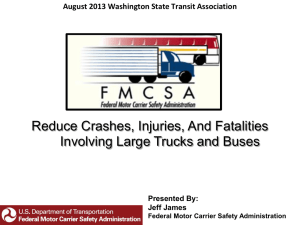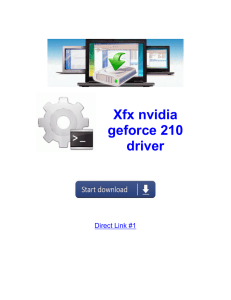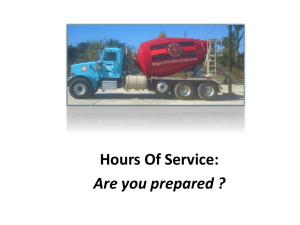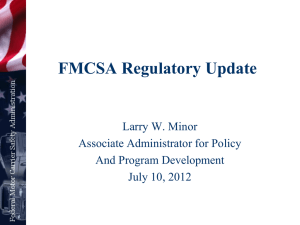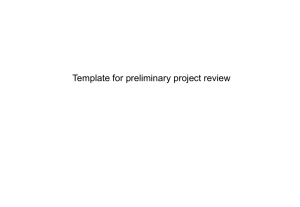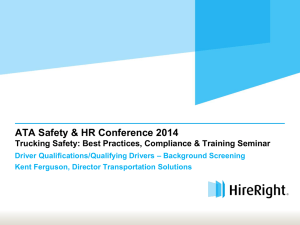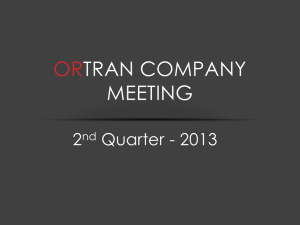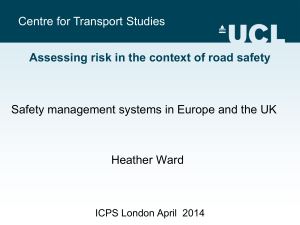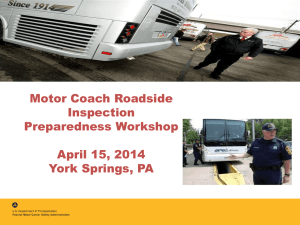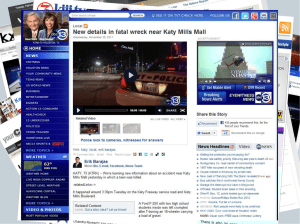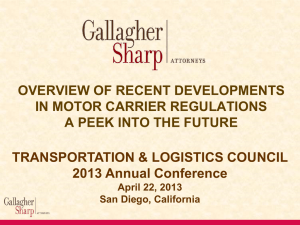FMCSA-What*s New? - Duluth Superior Transportation Association
advertisement
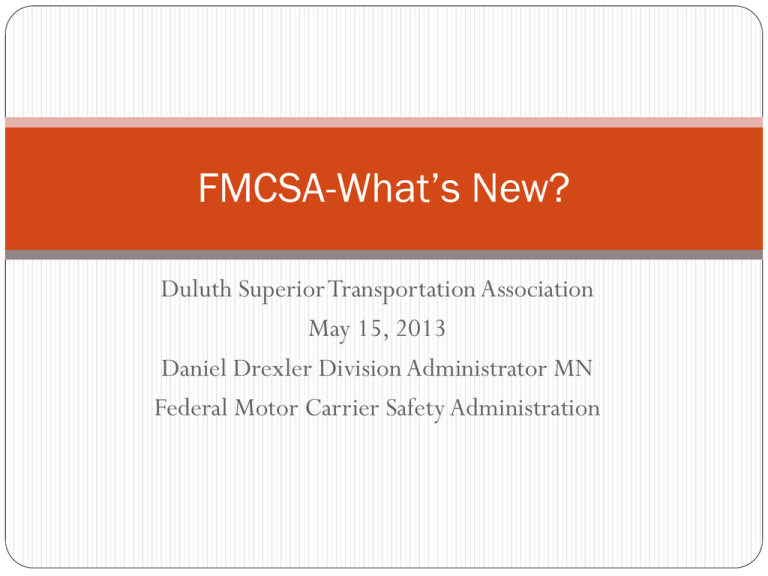
FMCSA-What’s New? Duluth Superior Transportation Association May 15, 2013 Daniel Drexler Division Administrator MN Federal Motor Carrier Safety Administration FMCSA Priority Right Now Passenger Carrier Safety! Planning the trip is the most important safety consideration. Questions to consider. o When are you departing/arriving? o How many hotel nights are you staying ? o How many drivers is the company providing? o Are they flying or staging driver along the route? o Are the buses equipped with sleeper berths? o Do you expect the driver to drive at night? Map 21 Moving ahead for Progress in the 21 st Century MAP-21 directs FMCSA to pursue a number of important CMV safety initiatives: Requires a new rulemaking on electronic logging devices. Sets a deadline for establishing a new drug and alcohol clearinghouse for truck drivers. Requires FMCSA to develop standards for a system to notify employers of changes in their employees’ driving status. Establishes new registration requirements to catch reincarnated carriers. Ensures that new entrants understand the safety rules before entering the industry. Map 21 Moving ahead for Progress in the 21 st Century Mandates Overlap with Some of the Agency’s 2012 Priorities EOBR (Electronic On-board recording devices) = (ELD Electronic logging devices) Patterns of Safety Violations Safety Fitness Determination Drug & Alcohol Clearinghouse National Medical Registry Map 21 Moving ahead for Progress in the 21 st Century Examples of MAP-21 Provisions that Take Effect Oct. 1, 2012 Increase enforcement penalties. Imminent hazard authority for unsafe property carriers including impoundment. Improved grant standards to States for CMV-safety grants. New authority to order the return of household goods held hostage. Agricultural exemption provisions. Map 21 Moving ahead for Progress in the 21 st Century FMCSA is developing new rules URS 2 Rule – Will implement new registration requirements, New registration fee and registration requirements for brokers and freight forwarders. $75,000 Bond Requirement up from $10,000 MAP-21 Omnibus Rule –Will include 16 MAP-21 provisions that are non-discretionary and self executing, like increased penalties and enhanced safety authorities. MAP 21 Moving ahead for Progress in the 21 st Century Steps currently being completed NOW Stakeholder outreach to obtain input on MAP-21 priorities. Safety Advisory Committee Driver and carrier outreach Incorporate MAP-21 priorities into multi-year strategic planning Complete SAFETEA-LU mandates. Educate Agency field staff and State partners on new safety authorities and responsibilities. Update grant agreements to reflect new State reporting requirements. Update penalty matrix to incorporate new penalty levels and penalty considerations. Certified Medical Examiners The National Registry of Certified Medical Examiners (National Registry) is a Federal program that establishes requirements for healthcare professionals that perform physical qualification examinations for truck and bus drivers. To become a certified medical examiner (ME) and be listed on the National Registry, healthcare professionals must complete training and testing on the Federal Motor Carrier Safety Administration’s (FMCSA) physical qualifications standards and guidelines. http://nrcme.fmcsa.dot.gov/ Certified Medical Examiners The National Registry web site is accessible to carriers, drivers, enforcement officials, and the general public. Compliance Date May 21, 2014 – All CMV drivers seeking a medical certificate must use a ME on the National Registry. Please contact your Clinic’s and find out if and when the Medical Examiners will become certified. To find out all you or the Clinic need to know go to http://nrcme.fmcsa.dot.gov/ Medicals and CDL Holders What is changing? State driver licensing agencies (SDLAs) will be adding your medical certification status and the information on your medical examiner’s certificate to your Commercial driver’s license system (CDLIS) record. When does this change start? This change started on January 30, 2012. What is not changing? The driver physical qualification requirements are not changing. What are CDL holders required to do? You must determine what type of commerce you operate in. Medicals and CDL Holders You must certify to MN DVS or WI DMVto one of the four types of commerce you operate in as listed below, Interstate non-excepted:You are an Interstate non-excepted driver and must meet the Federal DOT medical card requirements. Interstate excepted:You are an Interstate excepted driver and do not have to meet the Federal DOT medical card requirements. Intrastate non-excepted:You are an Intrastate non-excepted driver and are required to meet the medical requirements for your State. Intrastate excepted:You are an Intrastate excepted driver and do not have to meet the medical requirements for your State. If you are subject to the DOT medical card requirements, provide a copy of each new DOT medical card to your DMV prior to the expiration of the current DOT medical card. Medicals and CDL Holders Minnesota Driver and Vehicle Services New Federal Motor Carrier Safety Regulations for Minnesota went into effect for commercial driver’s license (CDL) holders on January 30, 2012 MN DVS -WEBSITE https://dps.mn.gov/divisions/dvs/Pages/cdlmedical-self-certification-information.aspx Medicals and CDL Holders Minnesota Driver and Vehicle Services 171.162 Subd. 6. Downgrade of license; notice. (a) If a licensee has previously certified to the department that the licensee is subject to the medical examination requirements of chapter 221 or Code of Federal Regulations, title 49, part 391, DVS shall send written notice if the licensee's medical examiner's certificate or medical waiver has expired or been removed, rescinded, or revoked. (After 60 Days) The notice must state that the commercial driver's license will be downgraded to a class D driver's license unless, within 30 days of the date of the notice, the licensee submits to the department. CDL Learners Permit (CLP) Required State Compliance on or before July 8, 2015. FMCSA requires background checks on test examiners at the time of hiring. Requires States to perform the criminal background checks on knowledge and skills test examiners only at the time of hiring and once on existing examiners. Allow driver training schools that are also a third party skills tester to test their own students only if an individual examiner does not administer the skills test to drivers he or she skills trained. Checking for legal presence and domicile as it applies to initial issuance of CLPs and the renewal of CDLs. More Hours Of Service July 1, 2013 Restart must include 2 night periods between 1:00-5:00 a.m. The restart must cover at least 34 consecutive hours and include at least two periods between 1:00 a.m. and 5:00 a.m., Although both alternatives cover most estimates of when the “window of circadian low” occurs, the 4-hour (rather than 6-hour) period addresses concerns drivers raised in the comment period by giving drivers greater flexibility in ending and beginning the restart. Hours Of Service July 1, 2013 Hours Of Service July 1, 2013 Why is this rule being issued? The goal of this rulemaking is to reduce • The risk of fatigue-related crashes and • The long-term health problems for drivers. This rule cannot ensure that drivers will be rested, but it can ensure that they have enough time off to obtain adequate rest on a daily and weekly basis. The objective of this rule, limit the maximum number of hours per day and week that the drivers can work. The rule reduces a driver’s average maximum allowable hours of work per week from 82 hours to 70 hours, a 15% reduction. The 15% reduction in the average maximum allowable hours of work in the new rule results from the restrictions on the use of the restart period. Hours Of Service July 1, 2013 What is wrong with taking two 34-hour restarts in a week? Multiple restarts in each week would not generally be a problem. o If restarts are taken every 6 days, a problem does arise: under existing rules, alternating 14 hours on-duty and 10 hours off, a driver would reach 70 hours in less than 5 full days. After a 34-hour break, the driver could then begin this same cycle again, totaling 70 hours on-duty every 6 calendar days, for an average of almost 82 hours per calendar week. o Limiting restarts to one every 168 hours (once a week) prevents this excessive buildup of on-duty hours, while still allowing drivers to use the restart provision to their advantage and avoiding the complexity of special provisions for more frequent restarts. Hours Of Service July 1, 2013 Are the two nighttime periods based on the driver’s terminal time or local time, when different? Drivers’ logs are based on the time zone of their home terminal. The 2-night periods are, therefore, set by the time at the home terminal. They are not related to “local time.” Does the 30 minute break count against the 14-hour driving window? Yes. Allowing off-duty time to extend the work day would allow drivers to drive long past the time when fatigue becomes extreme. The 14-consecutive-hour rule was adopted to prevent that and to help drivers maintain a schedule that is consistent with circadian rhythms. Where to find this www.fmcsa.dot.gov Latest CSA Changes 12/12/12 The SMS improvements will give FMCSA more precise information to assess a company’s on-the-road safety performance. The enhancements implemented today include: Moved load securement violations into the Vehicle Maintenance BASIC Changed the Cargo-Related BASIC to the Hazardous Materials (HM) Compliance BASIC Removed vehicle violations from driver-only inspections and driver violations from vehicle-only inspections Latest CSA Changes 12/12/12 Better aligned the CSMS with IEP regulations Aligned EOBRs to paper equivalent Modified the treatment of 1-5 speeding violations Modified the treatment of generic speeding violations Changed the name of the Fatigued Driving (HOS) BASIC to the HOS Compliance BASIC Questions MNSP District 4700 1110 Centre Pointe Curve, Suite 410 Mendota Heights, MN 55120 Phone 651-405-6171 www.dps.state.mn.us/patrol/index.htm FMCSA-MN Galtier Plaza , 380 Jackson St Suite 500 St. Paul, MN 55101 Phone 651-291-6150 www.fmcsa.dot.gov MNDOT Commercial Vehicle Operations Unit Transportation Building, MS 420 395 John Ireland Blvd. St. Paul, MN 55155 Phone 651-215-6330 www.dot.state.mn.us/motorcarrier
